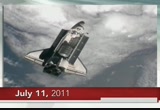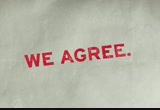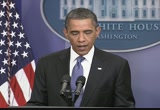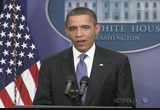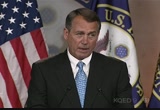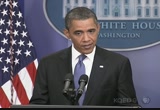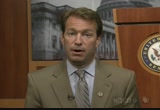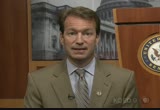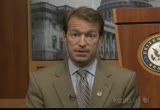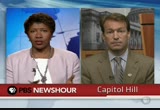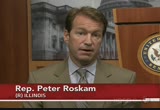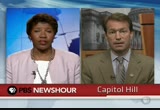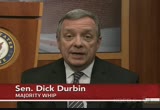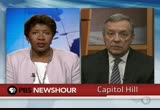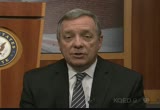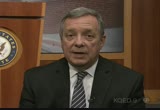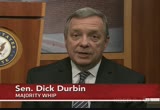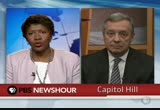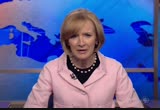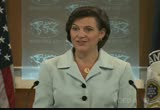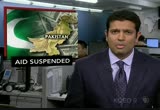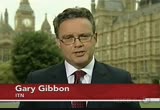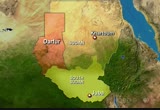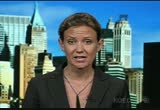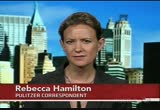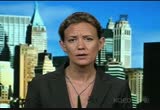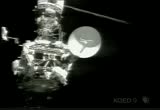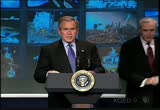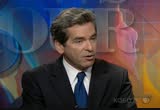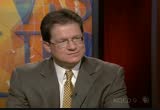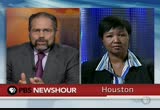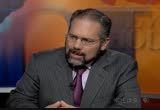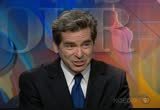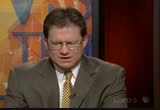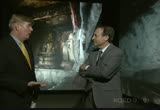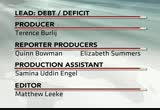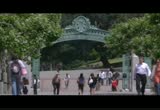tv PBS News Hour PBS July 11, 2011 6:00pm-7:00pm PDT
6:00 pm
captioning sponsored by macneil/lehrer productions >> ifill: president obama and speaker boehner raised the stakes on the debt negotiations today, each calling on the other to compromise. >> now is the time to deal with these issues. if not now, when? >> but it takes two to tango. and they're not there yet. >> ifill: good evening, i'm gwen ifill. >> woodruff: and i'm judy woodruff. on the "newshour" tonight: we get t latest on t t p ptitianan ststleleteterom democratat senatat d dk durbin andnd pupuicic c cgressman peter roskam. >> ifill: then, we examine the challenges facing the world's newest nation-- south sudan. >> woodruff: ray suarez explores the post-shuttle era of space exploration with former astronaut mae jemison, former nasa official eric sterner and
6:01 pm
"newshour" science correspondent miles o'brien. >> ifill: and jeffrey brown visits an art exhibit that unravels the mysteries of chinese temples dating back to the 6th century. >> this is a story of ancient history and the littest technology. and for you mystery and csi fans, yes, great treasures have been lost and an investigation is ongoing. >> ifill: that's all ahead on tonight's "newshour." major funding for the pbs newshour has been provided by: >> oil companies have changed my country. >> oil companies can make a difference. >> we have the chance to build the economy. >> create jobs, keep people healthy and improve schools. >> ... and our communities. >> in angola chevron helps train engineers, teachers and farmers; launch child's programs. >> it's not just good business. >> i'm hopeful about my country's future. >> it's my country's future.
6:02 pm
>> and by the bill and melinda gates foundation. dedicated to the idea that all people deserve the chance to live a healthy productive life. and with the ongoing support of these institutions and foundations. and... this program was made possible by the corporation for public broadcasting. and by contributions to your pbs station from viewers like you. thank you. >> ifill: president obama and congressional leaders from both parties were back at the negotiating table this afternoon. the meeting lasted for 90 minutes and a deficit reduction deal continued to prove elusive. the president had a stern message for republicans this morning, after hopes for a sweeping deficit deal foundered over the weekend.
6:03 pm
>> i do not see a path to a deal if they don't budge-- period. i mean, if the basic proposition is it's my way or highway, then we're probably not going to get something done because we've got divided government. >> ifill: mr. obama pressed republicans to agree to new tax revenues and democrats to accept spending cuts in a deal to raise the debt ceiling, the government's borrowing limit. and he said he would not settle for a short-term compromise. >> the things i will not consider-- 30 day, 60 day, 90, 180 day stopgap this is the united states of america, we don't manage our affairs in three month increments. we don't risk u.s. default on obligations because we can't put
6:04 pm
politics aside. >> ifill: house speaker john boehner, who initially endorsed that idea of a grand bargain, that could have included $4 trillion in savings, pulled his support over the weekend. today, he said the president is to blame for the deadlock. >> i think the president and i understand that nation faces very difficult decision. clearly, there is no personality difference between me and the president. i get along with him fine. this boils down to two things: the president continues to insist on raising taxes, and not serious about entitlement reform. i want to get there. i want to do what i think is in the best interests of country.
6:05 pm
but it takes two to tango. and they're not there yet. >> ifill: compromise, which seemed within reach only days ago, appeared more distant today as boehner repeated accused the white house of seeking to increase taxes. >> but the american people will not accept and the house will not pass a bill that raises taxes on job creators. >> ifill: the president's response today: if not now, when elections are still months away. when? >> if we think it's hard now, imagine how these guys are going to be thinking six months from now in the middle of an election season when they're all up. it's not going to get easier, it's going to get harder. so, we might as well do it now. pull off the band-aid, eat our peas. i'm prepared to take on significant heat from my party to get something done and i expect the other side should be willing to do the same thing if
6:06 pm
they mean what they say, that this is important. >> ifill: boehner said he is only willing to pay the political price for the right deal. >> i understand this will take sacrifice, political capital on both sides. i am willing to take my fair share. but if we're going to take political capital, let's step up and do right thing for country. >> ifill: both leaders have been pressured by members of their own party. the club for growth, a conservative group, released this video today. >> what will republicans do? cave in or show some spine? >> ifill: the administration has warned lawmakers must raise the debt ceiling by august 2 or risk another recession. >> i will say that some of the professional politicians know better. and for them to say that we shouldn't be raising the debt ceiling is irresponsible. they know better. >> ifill: one who's taken that stance-- republican presidential candidate michele
6:07 pm
bachmann campaigned against raising the debt limit increase today in iowa. >> i say take that shovel out of their hands and stop digging us deeper into debt. >> ifill: negotiators returned to the white house for the third time in five days today, and said they will meet daily until an agreement is reached. for more on the latest twists and turns in the negotiations, we're joined by a republican and a democrat involved in the debate. first, representative peter roskam of illinois, a member of the republican leadership. he also serves on the house ways and means committee. congressman ross came one of the things we seem to hear today listening to the president and speaker boehner is they both agree there ought to be a vote on raising the debt ceiling and that the debt ceiling should be raised. is that fair, that that is an area of agreement s that fair to say? >> i think there is an area of agreement that says the trajectory of spending in washington, d.c. fundamentally has to change. there was a bipartisan vote a few weeks ago in the house of representatives that
6:08 pm
rejected on a bipartisan basis the notion of simply raising the debt ceiling without any preconditions. and what i think speaker boehner and others have said and what i'm hearing from my congressional district is that any increase in the debt ceiling needs to be coupled with cuts that are deeper than the increase. >> ifill: we're talking about cuts, we were talking last friday, at least the president and speaker boehner seemed to be talking in the range of $4 trillion. now today at the hearing we are hearing they were talking more in the range of $2 trillion. what is acceptable for republicans. >> well, i think the big stumbling block right now is the president's insistence on raising taxes. and i think we need to go back two years ago in 2009 when president obama was asked in indiana do you raise tacks during a recession. and he very eloquently i think answered the question. and he said no, don't do that. and he laid out the economic reasons for not doing that. now look, this economy is begging for mercy. we're at 9.2% unemployment.
6:09 pm
an i think it's time to move off of this notion that somehow the remedy is to increase taxes on job creators. let's focus in on these cuts. let's make thoughtful and wise cuts and let's come together on this in a fashion that makes sense all the way around. >> ifill: listening to both sides of this debate it seems one man's taxes are another man's revenue increases and it's a question of whether you are talking about raising net taxes or not -- or increasing revenues at all. you could imagine that the average viewer trying to make sense of this doesn't know which definition you are talking about. >> here's the definition i think that should be guiding us. the joint committee on taxation which is a nonpartisan or a bipartisan entity here in the united states congress is said that 94% of all small businesses pay taxes at the individual income tax rate so what does that mean? that means when you raise the individual income tax rate you are having an adverse impact. you're raising taxes on job
6:10 pm
creators. half of all income in the united states or half of all revenues are coming from business taxes. so this notion that we can somehow raise taxes on the very people that we want to put capital at risk, i think is a direction that the country has wholeheartedly rejected. >> ifill: the democrats or at least the president has said that he is willing to make some trimming of benefits a part of this package. and that's presumably affecting social security and medicare which has made some people in his party unhappy. he said both sides should be willing to take significant heat. what significant heat are republicans willing to accept? >> well, the significant heat is raising the debt ceiling, accruing two more trillion dollars in debt at a time when most americans look at washington d.c. and say it is terribly disconnected to the reality of what they are dealing with in their own business. and the reality of what they're dealing with in their homes. the notion of increasing the debt sealing is a very unpleasant one. >> so you're saying just the notion of increasing the
6:11 pm
debt sealing is all that republicans are willing to concede in this compromise? >> what i'm saying is that republicans are committed to making sure that small businesses don't see a tax hike at the very time when job creation is something that we are so hungry for. and that they are interested in a game changer. in other words, the notion that we can borrow and spend our way into prosperity i think is a fool's errand. it hasn't worked. we've seen a stimulus bill where we're 27 months out fray stimulus bill and unemployment is still over 9%. we're 12 months out from the so-called recovery summer. and it's been a miserable failure. let's acknowledge the failure. let's move in a different direction and let's move forward. >> ifill: here's what i am missing congressman roskam, you believe that the debt ceiling -- do you believe it would be a bad thing if the debt sealing were to the raised. and if you believe that, other than getting additional revenues, how do you do that? >> i think you deal with the types of cuts that house republicans propose and pass through the house of
6:12 pm
representatives in april of this year, a very thoughtful pathway to prosperity ultimately that begins to make sense. so that's where the lion's share of the energy should be. i think that if the president had devoted the same level of commitment and energy to cutting and those types of things and prioritizing that he has to raising taxes, i think we would be in a different position. >> ifill: and does that include benefits cuts in your opinion? >> well, we took on medicare, for example. we said let's deal with folks who are basically in my age group. i'm 50 years old. take age -- 4 and below and you can come up with a different trajectory on medicare. house republicans have taken those tough votes and i think are prepared to stand by them. >> ifill: you say tough votes. one of the things the president said today is a lot of members of congress may not be willing to make a lot of tough votes in the next six months because of elections. do you see that argument at work behind the scenes, behind closed doors with the
6:13 pm
republican conference that people ray little bit nervous about what is going to happen in the fall if they take these votes now. >> well, i think if the president could rethink it, he would want to shy away from actually arguing that you want to do what the public doesn't want you to do. in other words, is he saying that the closer you get to election than that is going to really animate your behaviour. i think what most americans say is they want washington d.c. to do the right thing, to do the right thing whether it's november 1st or whether it's any other time of the year. >> ifill: congressman peter roskam of illinois, thank you so much. >> thank you. >> ifill: we turn to your colleague also from illinois democrat dick durbin, he also took part in the white house meeting this afternoon. welcome senator durbin. >> thank you, good to be with you. >> ifill: you just heard what congressman roskam said about taxes. i want to take that on first of all, which is is what the president is doing in these nirxs asking republicans to raise taxes? >> well, of course he is. because elise ens to their list of things that they
6:14 pm
want to achieve. i listened to it today, congressman cantor spelled out what wants to achieve. he wants to raise the cost of student loans for young people from working families. he wants to raise the cost of medicare for senior citizens. he wants to make it more difficult for hospitals that are providing med car -- medical care for the poorest people in america to be reimbursed so what they are asking for is sacrifice from a lot of people who are struggling today. children of working families and elderly people and those who are providing for the poor among us. and the president is saying you cannot really in good conscience say you want the sacrifice from these people and then not ask the wealthiest among us to pay even a penny more in taxes. that is just not going to work politically and it certainly isn't fair. >> ifill: if you are a member of your constituency at home in illinois and you are watching two people who represent you in congress having this discussion tonight, is there a basic common agreement that both of you have or that each of you, that all of you have
6:15 pm
about whether this debt ceiling vote needs to happen? >> well, i certainly believe it would be a disaster. an economic disaster if we don't extend the debt ceiling it would be the first time in the history of the united states that we defaulted on our debt. i just say to homeowners across america, what would happen if you didn't make your mortgage payments this month and you went to refinance your mortgage next month, basically people would say we're not sure we want to loan you any money. and if we do it will be at a higher interest rate that is what america faces. if we follow the lead of people like congresswoman bach mann that says it makes no difference, let's default on our debt for the first time. they're not thinking it through. we need a leadership is a that is the american economy is fragile, recovering way too slowly. and for us to inflict this damage this injury on our economy by not doing our job in washington, that just isn't the right thing-to-do. >> ifill: at what cost, senator durbin. the republicans are not very happy about the idea of revenue increases and a lot of democrats aren't very happy about the idea of cutting benefits. where is the sweet spot here? >> well, i can tell you where i think it is, because
6:16 pm
i have been working on it for a year and a half. it started with the bowles simpson presidential deficit commission. the answer is to put everything on the table, everything. i'm talking about spending, entitlements and revenue. to come up with a plan that really does reduce this debt inn honest way over a ten-year period of time. and to do it in a fair fashion. that's the only things that's going to work here. this idea that the republicans are going to walk away again from a conversation about serious deficit reduction is unacceptable. you may remember this started two years ago when we passed the deficit commission. we tried to on the floor. seven republican senators who cosponsored it voted against it and it failed. it happened again when eric cantor the republican majority leader walked out of the negotiations in the biden bipartisan budget talks. >> ifill: but senator i also remember hearing house leader nancy pelosi saying that she would not accept any cuts in benefits, which also you say and the president says has to be on the table.
6:17 pm
>> i can tell you, it is going to be a difficult task to sell any changes in medicare or social skoourlt or medicaid for that matter. but i can tell you this too, i think i speak for nancy in this regard. i'm certainly speaking for myself. we're not going to attack the basic benefit structure of these programs that is what was wrong with the house republican budget. what i just heard hear from my colleague from illinois is to return to the house republican budget. do you know that imposed an additional $6,000 a year cost in premium cost on medicare recipients. now that may work for him it may work for me. it's not going to work for low income seniors. so when it comes to making changes in medicare and medicaid so they are stronger for a longer period of time, i can tell you the democratic side-of-it is that we started these programs, we believe in them. we're to the going to let them go away. >> ifill: i asked congressman roskam -- roskam what significant heat republicans are willing to take. he said simply the raising of the debt limit is significant heat. what significant heat are democrats willing to take in
6:18 pm
order to come up with a compromise. >> let me say it is no heat to vote for a debt ceiling extension that is paying for a war which these republicans have supported and want us to continue to be part of. that to me is part of our responsibility. now what are democrats prepared to accept, i think we need to be prepared to accept real reform when it comes to entitlement programs. i want to make social security stronger, beyond the 125 years that we expect it to be strong. i want it to be strong for 75 years. i want to make sure that medicare is there in eight years, paying to the people as promised in an efficient way so we provide quality medical care for seniors and the disabled. we can make these changes in entitlements and do it in a fashion that still preserves the basic benefits. >> did you feel that you made any progress this afternoon? >> no, it was slow going this afternoon. the president listened carefully as the republicans laid out their plan and in the end said the math just doesn't add up it doesn't get to the numbers that you are suggested. so we've got to come back tomorrow and look at this from a different perspective. >> what about what the president said about the
6:19 pm
politics of the fall campaign, is this something which you hear people talking about, concern either whether democrats don't want to lose medicare or don't want to take votes which would hurt them? >> here is what i hear back home. first jobs and the economy. people want to get back to work. they want to see the economy stronger, businesses doing well secondly, that people feel very vulnerable amount of lot of folks are living paycheck to paycheck, barely getting by and they want to make sure social security is going to be there when it comes time to retirement. they know they can't couldn't on your savings or a pension plan from a company that has gone bankrupt. they want to make sure medicare will be there too. because medicare is really their lifeline at a time in their life when insurance is the most expensive. so they want us to make sure at the end of the day whatever changes we make, we preserve the basic benefit promises of those programs. >> senator richard durbin of illinois thank you so much. >> thank you too. >> woodruff: still to come on the "newshour": the birth of a new nation; what's next for space exploration and a high tech tale of ancient temples.
6:20 pm
but first, the other news of the day. here's hari sreenivasan. >> sreenivasan: wall street staggered into a new week, hit by worries over the debt standoff in washington and the ongoing debt crisis in europe. the dow jones industrial average lost 151 points to close above 12,505. the nasdaq fell 57 points to close at 2,802. government loyalists in syria attacked the u.s. and french embassies in damascus today. it was retaliation for the french and american ambassadors visiting an opposition city last week. mobs gathered outside the u.s. embassy where they chanted protests and burned the american flag. they breached a wall and broke windows before being dispersed by u.s. marine guards. in washington, state department spokeswoman victoria nuland condemned the attack and the regime's response. >> the syrian government has not lived up to its obligations under the vienna convention to protect diplomatic facilities. and it's absolutely outrageous.
6:21 pm
they have not done the job that all governments are supposed to do i protecting the diplomatic facilities of all resident diplomats in their country. >> sreenivasan: u.s. officials said there were no injuries to embassy staffers. in iraq, u.s. defense secretary leon panetta threatened stronger action to stop iran from arming shi-ite militias, who attack u.s. troops. panetta spoke to a group of u.s. soldiers in baghdad and said: "this is not something we're going to walk away from. it's something we're going to take on head on." panetta also met with prime minister nouri al-maliki and president jalal talabani. they discussed keeping some u.s. troops in iraq after the withdrawal deadline in december. officials in pakistan today played down a u.s. decision to suspend $800 million in military aid. u.s. officials confirmed it on sunday. but, a pakistani spokesman insisted today that operations would continue without external support. tensions between the two nations have escalated since the u.s. raid that killed osama bin laden inside pakistan.
6:22 pm
reports in britain now say former prime minister gordon brown was one of the victims of phone hacking by a tabloid newspaper "news of the world". the rupert murdoch media conglomerate has closed the paper. and it delayed efforts today to take over another company, british sky broadcasting or, b- sky-b. we have a report from gary gibbon of "independent television news." >> reporter: gordon brown wooed the murdoch empire like the best of them. but they turned on him, backing david cameron in the last election. today, he turned on them. gordon brown believes his phone and that of his wife may have been hacked into by the "news of the world." he believes someone working on behalf of the "sunday times" accessed his bank account and he believes his son's medical records were obtained by the "sun" newspaper. >> that they had information that fraser had cystic fibrosis
6:23 pm
which was a matter that they the family were just getting their heads around at the time and dealing with. >> reporter: it was a fast moving day of swirling allegations, political and corporate positioning. amongst the allegations, it was suggested that royal protection officers in the police force had sold confidential royal numbers to the news of the world, that the prince of wales and the duchess of cornwall may have had their phones hacked into. halfway through the day, rupert murdoch announced that he was suddenly changing his tactics for how he could get his hands on the 61% of b-sky-b he doesn't already own. rupert murdoch woke up at his london home with a new plan for how to get his hands on the whole of b-sky-b. he'd go down the route he'd been trying to avoid, a drawn-out reference to the competition commission. the commission doesn't normally complete its reports in under a year. but the murdochs have decided their best chance of keeping their takeover bid in play is to go down this road.
6:24 pm
>> reporter: earlier, the deputy prime minister met with the family of the murdered schoolgirl, milly dowler. it was the revelation that the "news of the world" hacked into the girl's phone messages after she'd been abducted, that triggered the shutdown of the newspaper. the family repeated their call for the news international boss rebekah brooks, who edited the "news of the world" at the time, to resign. >> sreenivasan: in another development, scotland yard released a statement accusing unnamed individuals of trying to sabotage its investigation. part of that probe involves allegations that murdoch journalists paid bribes to police for information. rescuers in russia searched a huge reservoir on the volga river today, after a cruise boat sank on sunday. at least 55 people were killed, with 79 rescued and dozens more missing. it happened about 450 miles east of moscow, in windy, rainy conditions. the boat sank in just eight minutes. today, debris was visible in the water as search boats looked for victims and survivors. families stood by, hoping for news. those are some of the day's major stories. now, back to judy. >> woodruff: and we turn to africa where a nation is born, but with many troubles. at midnight friday in juba, the capital of the new south sudan,
6:25 pm
this sign said it all: "free at last". the turning of the clock to july 9, saturday, meant independence, and the creation of the world's newest nation. >> i am sending good luck to all the southern sudanese. >> woodruff: but the jubilation in the streets of juba came at a brutal cost. civil war killed two million people throughout sudan, spread across five decades. a 2005 peace agreement set the stage for an independence referendum this past january. southern sudanese-- largely christian and animist-- voted overwhelmingly to secede from the muslim and arab north. the new president of south sudan, salva kiir, spoke of the bloody past after taking his oath of office. >> we have to forgive although we will not forget.
6:26 pm
>> woodruff: indeed the run-up to independence day in south sudan had been marred by violence along the border in the abyei region, claimed by both sides and in the nuba mountains of the northern state of southern kordofan. >> people of south sudan: congratulations! >> woodruff: saturday's 10-hour- long independence ceremony was held in blistering heat with a large u.s. delegation on hand, led by u.n. ambassador susan rice. she also opened the new u.s. embassy in juba, along with former secretary of state colin powell, who helped broker the 2005 accord. also there, the president of sudan, omar al-bashir. he remains under international indictment for alleged war crimes committed in darfur, to the west. >> ( translated ): for the sake of peace, we have accepted the separation of the south out of the united sudan so that they can form a new country. although we believe that the unity of sudan was best for the
6:27 pm
north and the south. >> woodruff: the new nation of south sudan instantly became one of the world's poorest, despite extensive oil reserves. bashir's government in the north has controlled the oil industry for years. for more on what the new nation faces, we turn to rebecca hamilton, a pulitzer center reporter, who has been covering sudan for years. she recently reported from there for the "newshour" and the "washington post." she joins us now from new york. >> still rebecca hamilton, thank you for being with us. >> pleasure. >> woodruff: other than religion, tell us what makes this new country of south sudaf different from sudan the country it broke away from? >> well, firstly i think it's orientational, the orientation of the leadership is certainly going to be looking towards joining the east african community. whereas the government of sudan in the north tends to
6:28 pm
orient itself more towards the arab league. so in terms of where it positions itself regionally, i feel that the new country is going to be seen as more part of east africa. then it's landlocked which is going to be a huge challenge for this new country and in particular when it comes to oil it has 80% of the oil that was in the unified sudan but the only way that that oil gets out to export is through a port that is in the north up to the red sea. >> woodruff: and that oil, in fact, is an issue that is unresolved. how do you see them working through this? >> yes, it is unresolved. and it's one of those issues where both the north sudanese government and the government of south sudan are going to have to cooperate to keep the oil flowing it is sort of a mutually assured destruction where if either of them disputes then the oil flow could be cut off. and both of them need it but the government of south sudan is particularly vulnerable because the
6:29 pm
southern budget is 98% dependent on oil so unless that oil keeps flowing, they are very, very vulnerable. and they really have a huge need to diversify their economy. >> woodruff: rebecca hamilton, what are the other main challenges facing this new country? >> can i just say before the challenges that it's a huge moment of expectation because i think we can get so quickly bogged down in the challenges and what you have here is the greatest resource, is the people among whom everybody knows someone without died in that war. and so the stakes are so huge to make this project in south sudan work to honor the memory of those killed. but the challenges are enormous. and i think the first one is whether this government, this new government is going to be able to deliver on citizen expectations. if you go and interview people who are not in the capital city who are out in the rural areas and ask them what are their expectations of the new nation, they don't talk about an abstract
6:30 pm
sense of nationhood. they talk about real concrete change in their daily lives. are they going to be hospitals. are there going to be schools that are not under a tree. are there going to be roads. and they have been blaming the north, 9 sudanese government in the north for not having those things. that's certainly been a huge part of the story but it's not the only thing and the question now is whether this new government is going to be able to deliver services to the population before they get frustrated. if they do get frustrated, there is every chance they won't channel that frustration through a political channel but will, instead, resort to arms that prolific across the region. >> woodruff: now there's still conflict in the region. in the north unresolved. we touch on some of those in the piece just a moment ago. how much does all of that around this area unresolved and the other issues affect the health of in new cli? >> it's intimately involved. i think it's worthwhile
6:31 pm
seeing the success of this new country is based on three buckets of issues. the first is what whats inside the house, the government challenges i was speaking of. what whats inside the north because if you have an unstable northern neighbor there is no way that the south is going to be stable. and what happens between north and south, issues like you mentioned in the introduction, still unresolved between the north and south as to what will be the final status. but it's also why what is happening in the mountains in northern sudan is relevant to the ultimate success of the south. if you have these kind of conflicts in these border areas, the south is to the going to be able to be stable. >> woodruff: so if you look at what has happened, is this a stabilizing thick that independence is now come to fruition or is it a dee stabilizing thing? >> i think that the jury might be out on that but with you would have to say that after generations
6:32 pm
literally of civil war, this seems for the moment at least to be the best solution that -- there was the option to try and make a unified sudan work. it hasn't worked. you heard the vote of the people very clearly. 98.5% of them saying we need to separate. so i think it's the only option for the moment. >> woodruff: i asked because we heard the new president saying we will forgive but we won't forget and then we heard ba sheer -- basheer saying something to the effect that unity would have been better. >> well, that's his position. and perhaps not necessarily based on the best interest of the southern sudanese people, i think they would argue. if there had been unified sudan then from ba shear's position his economy would be in a better shape than is now. as it is 80% of sudan's oil going to the control of the government of sot sudan. but there is the diversity
6:33 pm
of views across sudan but what very clearly the southern people had the right to was self-determination. and when they were given that choice, they decided that they wanted to separate so that is the right result. >> woodruff: rebecca hamilton what dow look for in the months to come to see whether this new country is getting on its feet or not. >> yeah. i think we've got to start firstly by changing the way we look at the new government of south sudan. for a long time the international community has seen the south as the victim which it has been the primary victim in the war years but now we've got to be able to hold it as accountable as we would fwhi other government to make sure it lives up to the expectations of its people. that means dealing with issues that already a problem, like corruption. a huge amount of corruption in the southern government right now. about making sure that it is putting in the work to start die vers fewing its economy because if are you 98% dependent on oil, are you in a very risky situation. and the good news is that south sudan is this
6:34 pm
incredibly fertile territory. if you go it is not the image that you have of sudan, it's green and it's lush. they there really could be a breadbasket for the region but it means they need to shift their focus and start developing the agricultural industry. and then i think the other key thing is whether they are going to avoid the fate of so many liberation movements which is that when they get into power they don't live up to the ideals that they were fighting for. and that means increang political space in south sudan. it's very much controlled by one party at the moment and they need to open up that space so that when there are inevitable challenges and frustrations, they get channeled to a political system. >> woodruff: rebecca hamilton, thank you for helping fill out the portrait of this new country we'll be watching. thank you very much. >> thank you. >> ifill: now, as the shuttle atlantis makes its final rendezvous with the
6:35 pm
international space station, what comes next? ray suarez looks at the future of the american space program. >> two, one, zero, and liftoff! >> suarez: it was the final countdown to the beginning of the end of the space shuttle era. after 30 years and millions of miles traveled, s.t.s.-135 or the space transportation system's 135th and final flight blasted off friday from florida's kennedy space center. >> the space shuttle spreads its wings one final time for the start of a sentimental journey into history. >> suarez: just over 30 years earlier on april 12th, 1981, nasa launched its very first space shuttle mission, as columbia took flight. since then, nasa's success stories have been numerous. nasa originally promised 50 flights a year, but never managed more than nine, the total bill was $196 billion or roughly $1.5 billion a flight. one of the original goals was constructing a permanent base in space, the now-completed
6:36 pm
international space station. in 1990, the shuttle discovery launched the hubble space telescope and in a famous repair mission, another crew serviced the hubble in orbit, to fix blurry images. there were two very public tragedies. the challenger explosion-- just after launch in january 1986-- killed seven astronauts including christa mcauliffe, the first teacher in space. and in 2003, columbia was destroyed as it returned from a mission, and seven more astronauts died. this time around, only four astronauts are aboard, along with enough supplies to keep the space station stocked for another year. once they've returned home, it will be up to russian soyuz capsules to ferry supplies and perform any rescues. hundreds of americans who worked on the shuttle program will be out of a job. they had hoped otherwise, after president bush announced the retirement of the shuttles, and put nasa on a course back to the
6:37 pm
moon and eventually mars, the constellation program. but the bush administration and congress never fully funded the program and it may not have reached the moon before 2028. president obama cancelled "constellation" in favor of possible trips to an asteroid and mars, but details remain sketchy at best. on sunday, nasa administrator charles bolden talked optimistically about the nation's future in space on cnn. >> between 2014 and 2015, i am very hopeful that you will see american astronauts climb back aboard american-produced spacecraft to go to the international space station, and not very long after that start flying some test hops on a nasa- led effort to explore beyond low earth orbit, go to deep space. >> suarez: as for the current mission, "atlantis" docked with the international space station for the last time over the weekend. and then this morning... >> ♪ i get knocked down, but i get up again ♪ you're never going to keep me down...
6:38 pm
>> suarez: ...a wake-up song for the astronauts from mission control, with lyrics symbolic of nasa's hopes for the future. we look at those questions about the future now with doctor mae jemison, a former astronaut who flew the space shuttle endeavor in 1992 and was the first woman of color to go into space. she is now the founder of her own technology consulting firm. eric sterner, an aerospace consultant who served as associate deputy director for policy and planning at nasa during the george w. bush administration. he's now with the george c. marshall institute. and "newshour" science correspondent miles o'brien who has long covered nasa. miles, let me start with you what is nasa for now, now that the space shuttle program has been wound down what is the day-to-day assignment there in. >> it's time for nasa to get out of low earth orbit, ray. and that is the good news out of this. that with the shuttle gone, the agency can at least contemplate pushing the boundaries of space and ultimately thinking about
6:39 pm
putting footprints on mars. we have some robots that have been on mars now for approaching 7 years or beyond 7 years now. spirit and opportunity. and they've done a lot of wonderful work trying to figure out that mars was once warm and wet. well, even the principal investigator in charge of that program would tell you that all that work that took all that time could have been done in just a couple of weeks with a human being on the surface and could in fact unlock that mystery of whether we are alone in the universe. that is a good mission and where nasa should be focused. >> suarez: but what is going on there right now? do they you have a specific thing they have to do by a specific date? and do they have money to do it? >> well,s that eat problem. i would say the question is big question marks on both cases. the fact of the matter is the money which should have been appropriateed initially when george w bush announced the cancellation of the shuttle program never materialized. and so the program that he envisioned which would have sent astronauts back to the moon and ultimately beyond
6:40 pm
to mars, never took hold. so obama reversed course. and now we're in a situation where there is no specific date, no specific destination, just embracing some technologies that will allow nasa to push beyond low earth orbit. will there be funding for that? will there be the political will and leadership to follow through? those are big questions. >> dr. jemison, did nasa make, short term, the right choices. don't head off on something until you know where you are headed? >> well, i don't think it's an issue of don't hid off. i think the issue is reallies what con tell says is going somewhere -- con tell says is going somewhere and was it worth waiting until 2028 to get rid of the space station and shuttle program and not have any human involvement in space. so i think it was the right answer given the budget constraints, given the time and what we needed to do. i think that one of the pieces that's lost in this is that the commerce space flight effort is really important because now we're really ushering in another
6:41 pm
era of space exploration where people have an opportunity who are not part of the government to have humans go into space. and i would add on that that what the government's role really had to be, nasa's role had to be to push space exploration further, to do the things that companies can't do, that individuals can't do. >> more on government involvement later. eric sterner, is nasa taking the right course right now? now that the shuttle program has reached its end? >> honestly, i think we find ourselves at an impasse. you saw an authorization bill enacted from congress. the president signed it. and the key thing in that is the space launch system, a very large rocket. honestly, it looks a lot like constellation. one of the challenges you have is nasa and congress disagree on whether or not it's doable. congress say does it here's the money. which it hasn't provided.
6:42 pm
and nasa says it's not doable. so you are at a point right now where the fundamental entities and government that pay attention in space don't agree on either the mission, how to get there, just don't know where you are going, and how much it's going to cost and when time frame you can do it in? >> suarez: do you have to move quickly to solve that tension? >> i think you do. i think the likelihood of that happening is very low. space politics are such that it only comes up every few years that congress and the executive branch have the willpower to make big decisions. we tend to find that in an authorization bill where we try to lay out a certain framework for the agency in the future. having done that once and spilled a lot of political blood in the small arena of space politics, i don't detect a lot of eagerness to to do it again. >> suarez: implicit in many of the public statements as to what happens with nasa now is this idea that if you aren't moving forward, are's
6:43 pm
moving backward that in space there is no such thing as standing still is that true? do things erode unless are you actively moving forward? >> i think that there is an erosion in terms of people's impression what is happening. but i think there is a forward movement as you start to look again at the commercial vehicles, as you start to look at actually developing propulsion systems. that's a forward movement. but yes, i think it's really critical that congress commits and actually funds programs and not, doesn't retrench on them and say do everything with nothing. >> suarez: miles, there is some concern of a more practical nature, that because there is no active craft to take americans into space, there are real safety considerations about the international space station and the need to keep america
6:44 pm
in the game even if we're not actively pursuing another mission. is that right? >> well, the space station was built by the shuttle, largely. and the subtle was designed to service and maintain a space station. so in a perfect world, you would like to have a space shuttle as long as you have a space station. now the space station is now built. we're just now beginning to get some sense of what his scientific capability might be and the shuttle goes away. so how do we maintain that? now there are a lot of smart engineers in houston and other places that have been spending a lot of time thinking about this. in this past mission is all about getting as much stuff, stuffing that atlantis to the gills with food and other things, anticipating problems that you know, uniquely the shuttle could help as the station goes down the line. the fact is between the russian so i uz rocket, european and japanese freighters, they've got it figured out and i think
6:45 pm
they'll be able to keep the station going there are some big pieces that only the shuttle can deliver ideally. but these are what these engineers sort of thrive on. trying to figure out a way to keep the thing going and they will. >> suarez: some people, eric sterner, have talked about private commercial involvement in space. is nasa getting out of the way, creating an opportunity, is that -- are there some things as dr. jemison suggested that only government can do or is this really a moment that the commercial space people have been waiting for? >> i think there are two parts to the answer. the first is when it comes to private sector nasa relies on the private sector for almost everything it does. private sector built the shuttle. it operates the shuttle. the key decision-making posts are civil servants and nasa. so the relationship between the government and private sector, it's not such that we can't do things differently in relying on the private sector. part of the administration doesn't concern me. what i do worry about is
6:46 pm
this notion that everything will be commercial. and therefore magic, will have these magical capabilities which will sort of appear. generally to, for something to exist commercely, it's success and it's sustainability is dependent on private markets. just plain old markets, laws of supply and demand. >> the administration seems to think by getting these guys started, basic providing massive subsidies to get them in the business, this commercial demand this private demand will magically appear and the government will be able to save money by buying capabilities at the margin. >> suarez: dr. jemison let me turn to you with that same question. can space travel go ahead as a private concern without large u.s. government involvement? >> well, i'm going to have to go along with eric on part of this. because you know, the government still is paying a fair amount of money in order to make sure that
6:47 pm
these commercial entities move ahead. i think that over the long run, humans going into space on commercial draft will be something that happens. but the government still needs to have a capacity to put humans into space and i think it's one of those things that we're working on is. >> suarez: i'm not sure s that a yes or a no? >> it's one of those things where you say yes, we need to continue to have government rolls in putting humans into space. and yes the commercial country has a role to play. >> suarez: dr. jemison, thanks a lot. eric sterner and miles o'brien, good to have you with us. >> thank you. >> thank you. >> suarez: bye-bye. >> woodruff: finally tonight, bringing together art, history, and science. jeffrey brown takes us through a unique museum exhibition. >> reporter: sculptures from 6th
6:48 pm
century china; the head of a buddha; a seated bodhisattva; a kneeling winged monster-- works of art from museums around the world. they tell a tale that goes back some 1,500 years. this is a story of ancient history and the latest technology. it's got religion and lots of art, and for you mystery and c.s.i. fans-- yes, great treasures have been lost and an investigation is ongoing. it begins in northeast china in what is today a rural coal- mining area at the xiangtangshan caves. the name means "mountain of echoing halls." in the middle of the 6th century during the northern qi dynasty, one of the shortest-lived but most creative in chinese history, artisans turned the caves into buddhist temples carving the limestone into beautiful sculptures and shrines. today, worshippers still come to the caves, but they pray to
6:49 pm
largely empty spaces. that's because in the early 20th century, looters forcibly removed many of the cave's sculptures in order to sell them on the international art market. >> all of a sudden these objects that were created as religious icons and really seen by many westerners in the 19th century as idols or icons of religious worship, all of a sudden these were considered fine art. >> reporter: keith wilson is the curator of ancient chinese art at the smithsonian's arthur m. sackler gallery of art in washington. >> basically that happens because of the world's fair movement. in 1900 world fairs there were often cultural displays from various countries throughout the world and this is where the west first saw things like chinese buddhist sculpture, and finally it's being recognized within the international canon of what fine arts is all about. so there was a demand. >> reporter: the sculptures made
6:50 pm
their way to art dealers around the world who then sold them to collectors, including western museums. this was decades before such transactions were prohibited by international law. now, experts are trying to, in a sense, put humpty dumpty together again. in part, they're doing it the traditional way-- creating an exhibition originated at the university of chicago's 'smart museum of art out of all the works they could gather from around the world. pieces like this hand of a buddha that's now in the collection of the asian art museum in san francisco. this gives us a sense of scale, among other things. >> the body that this hand belonged to, which is still in the cave, is about 20 feet tall. this hand was the proper left hand of a seated buddha. through the project, we're now able to identify that buddha as the buddha of the future or mytria, one of three buddhas that were on the central altars of the north cave at northern
6:51 pm
xiang. >> reporter: but what makes this project so unusual is the merger of art history and new technology to re-create one of the original caves using 3-d imaging. this digital cave is now part of the exhibition and allows us to see what the actual cave once looked like. the cave's surface was scanned by a chinese team from peking university which spent four weeks at xiangtangshan. a technical team in chicago then helped turn the scans into these wireframe images. chicago researchers also traveled the world to scan images of every sculpture and fragment they could find and then placed them digitally in bright yellow back into the cave. in doing so, wilson says, scientists and art historians learned even more about the original site. >> another result of this project has been really building the number of objects that we now know come from the place.
6:52 pm
>> reporter: how do you figure out that a particular piece actually belonged here? >> a couple of different ways. the old fashioned way is connoisseurship, where you compare the style of one head to another head. you know that this head comes the digitizing has also helped because it records so many details so correctly that in this physical matching that we were talking about it allows us to physically prove that a piece had been removed from the site. >> reporter: of course, this also raisesnother question: why not just re-create the cave for real and send the sculptures back to china? wilson says that with the works scattered in so many collections for more than 100 years, the chinese themselves recognize that's not going to happen and haven't made such a request. but the art/technology
6:53 pm
collaboration, he believes, does offer a new way to think about artworks and their original sites. >> i think for a lot of us maybe even from the first days of the project, there was a sense that the project does provide an alternative to the idea of repatriation, that is the physical return of the objects. the digital cave allows us to see these elements back in play. >> reporter: the unraveled mystery of the caves "echoes of the past" is at the sackler gallery until the end of july, when it moves on to museums in dallas and san diego. >> ifill: again, the major developments of the day: the stalemate deepened in the deficit talks. president obama insisted he won't accept a short-term increase in the debt limit, but republicans again rejected tax
6:54 pm
increases and democrats opposed any deal that relies solely on spending cuts. wall street had its worst day in early in a month, bothered by the lagging u.s. debt talks and the debt problems in europe. the dow jones industrial average lost 150 points. and pro-government mobs in damascus, syria attacked the u.s. and french embassies. and to hari sreenivasan for what's on the "newshour" online. hari? >> sreenivasan: there's more on the debt ceiling talks on this week's political checklist with gwen, judy and political editor david chalian. find a slideshow of images from the independence celebrations in south sudan. plus we talk to photographer stephanie sinclair, who spent nearly a decade documenting the lives of child brides around the world. her work was recently featured in "national geographic." our conversation is on the rundown blog. all that and more is on our web site: newshour.pbs.org. >> ifill: and that's the "newshour" for tonight. on tuesday, we'll look at what's at stake if lawmakers fail to raise the nation's debt ceiling. i'm gwen ifill. >> woodruff: and i'm judy
6:55 pm
woodruff. we'll see you online and again here tomorrow evening. thank you and good night. major funding for the pbs newshour has been provided by: and by the alfred p. sloan foundation. supporting science, technology, and improved economic performance and financial literacy in the 21st century. and with the ongoing support of these institutions and foundations. and... this program was made possible by the corporation for public broadcasting. and by contributions to your pbs station from viewers like you. thank you. captioning sponsored by macneil/lehrer productions captioned by media access group at wgbh
243 Views
IN COLLECTIONS
KQED (PBS) Television Archive
Television Archive  Television Archive News Search Service
Television Archive News Search Service 
Uploaded by TV Archive on

 Live Music Archive
Live Music Archive Librivox Free Audio
Librivox Free Audio Metropolitan Museum
Metropolitan Museum Cleveland Museum of Art
Cleveland Museum of Art Internet Arcade
Internet Arcade Console Living Room
Console Living Room Books to Borrow
Books to Borrow Open Library
Open Library TV News
TV News Understanding 9/11
Understanding 9/11
